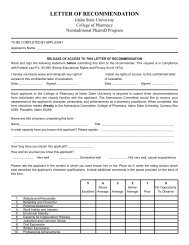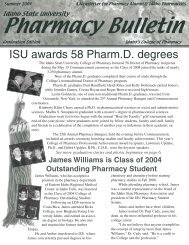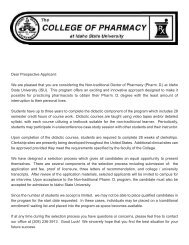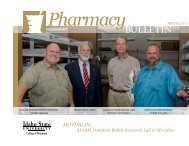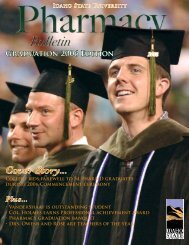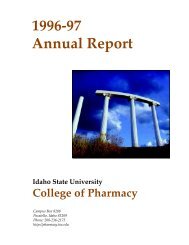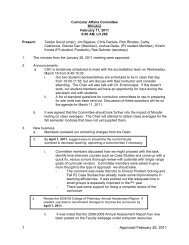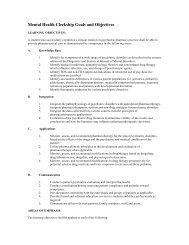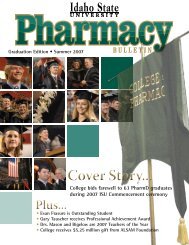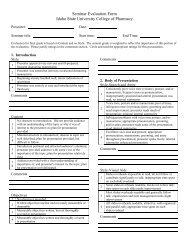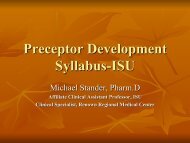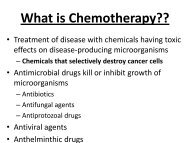By Franklin R. Cole, Ph.D. - College of Pharmacy - Idaho State ...
By Franklin R. Cole, Ph.D. - College of Pharmacy - Idaho State ...
By Franklin R. Cole, Ph.D. - College of Pharmacy - Idaho State ...
You also want an ePaper? Increase the reach of your titles
YUMPU automatically turns print PDFs into web optimized ePapers that Google loves.
The central theme <strong>of</strong> the <strong>Ph</strong>arm.D. program is<br />
the delivery <strong>of</strong> pharmaceutical care, which is<br />
the responsible provision <strong>of</strong> drug therapy for<br />
the purpose <strong>of</strong> achieving definite outcomes<br />
that improve a patient’s quality <strong>of</strong> life (Hepler<br />
& Strand, 1990). <strong>Ph</strong>armaceutical care involves<br />
the process through which a pharmacist collaborates<br />
with a patient and other pr<strong>of</strong>essionals<br />
in designing, implementing, and monitoring<br />
a therapeutic plan that will produce specific<br />
therapeutic outcomes for the patient. This<br />
in turn involves three major functions: (1)<br />
identifying potential and actual drug-related<br />
problems; (2) resolving actual drug-related<br />
problems; and (3) preventing drug-related<br />
problems.<br />
The philosophy <strong>of</strong> pharmaceutical care requires<br />
practitioners to utilize their knowledge<br />
and skills in order to identify individual patient-specific<br />
problems and create effective<br />
solutions for these problems. The practice <strong>of</strong><br />
pharmaceutical care requires the skill <strong>of</strong><br />
pharmaceutical diagnosis, which is the problem-centered,<br />
cognitive process used to identify<br />
patient-specific drug-related problems<br />
(Culbertson et al., 1997).<br />
General Abilities In preparation to meet these<br />
overall goals, students must acquire general<br />
abilities in the following six areas:<br />
1. Critical Thinking Abilities - In the acquisition<br />
and application <strong>of</strong> scientific<br />
concepts, pharmacy students must<br />
learn how to think critically. <strong>Ph</strong>armacy<br />
students must develop abilities<br />
that involve asking questions, defining<br />
problems, examining evidence, analyzing<br />
assumptions and biases, avoiding<br />
emotional reasoning and oversimplification,<br />
considering other interpretations,<br />
and tolerating ambiguity.<br />
2. Problem-Solving Abilities – In the<br />
process <strong>of</strong> developing critical and scientific<br />
thinking skills, pharmacy students<br />
must learn and practice problem<br />
solving. In particular, they must be<br />
able to reflect how such skills could<br />
and will help them transfer fundamental<br />
scientific concepts to the clinical<br />
setting via the application <strong>of</strong> sound<br />
scientific principles to solve relevant<br />
pharmacy-related problems.<br />
3. Pr<strong>of</strong>essional Communication Abilities<br />
As part <strong>of</strong> the acquisition <strong>of</strong> problemsolving<br />
abilities pharmacy students<br />
will master, in parallel, a set <strong>of</strong> pr<strong>of</strong>essionally<br />
relevant and useful communication<br />
skills such that their critical<br />
thinking and problem-solving strategies<br />
can be further enhanced through<br />
the skillful and appropriate use <strong>of</strong> oral<br />
and written communication. This<br />
complex skill includes: delivery <strong>of</strong><br />
clear and accurate information; congruence<br />
between one’s verbal and<br />
nonverbal messages; appropriate assertiveness;<br />
use <strong>of</strong> feedback to assess<br />
comprehension; and ability to communicate<br />
with a variety <strong>of</strong> populations.<br />
<strong>Ph</strong>armacy students should understand<br />
that the ability to communicate with a<br />
layperson is just as important as the<br />
ability to do so with a fellow health<br />
care pr<strong>of</strong>essional or practitioner. As<br />
pr<strong>of</strong>essionals, pharmacists must be<br />
able to do both adequately.<br />
4. Resource Utilization – <strong>Ph</strong>armacy students<br />
will learn and master the process<br />
<strong>of</strong> searching for, retrieving, evaluating<br />
and managing information from<br />
a variety <strong>of</strong> pr<strong>of</strong>essional resources (including<br />
computerized data bases,<br />
Internet resources, current/historical<br />
literature, and continuing education<br />
programs) to acquire the knowledge<br />
necessary to develop and implement a<br />
solution to a specific pharmacy-related<br />
problem, irrespective <strong>of</strong> practice setting.<br />
5. Responsibility and Patient Outcomes<br />
Students must be able to accept responsibility<br />
and accountability for patients’<br />
pharmacotherapeutic outcomes.<br />
This activity entails: a) the recognition<br />
that there are various points in the<br />
process <strong>of</strong> patient care at which the<br />
pharmacist intervenes; b) the provision<br />
<strong>of</strong> appropriate intervention<br />
strategies; c) the generation and maintenance<br />
<strong>of</strong> appropriate patient records<br />
2006 <strong>College</strong> <strong>of</strong> <strong>Ph</strong>armacy Student Handbook 10



